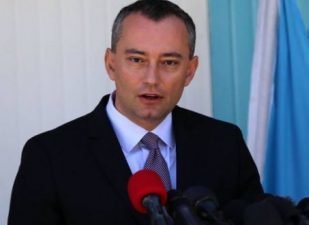United Nations Special Coordinator for the Middle East Peace Process, Mr. Nickolay Mladenov, said on the electricity crisis and protests in Gaza : ”I am following, with great concern, the tense situation unfolding in Gaza, after two million Palestinians have been left with just a couple of hours of electricity per day in the middle of winter.
He added, according to the PNN :” I call for the full respect of the right to freedom of expression, peaceful protest and assembly in Gaza. All responsible authorities must cooperate to resolve the electricity crisis immediately.”
Crowded marches had set off in the northern Gaza Strip, mainly in the Jabaliya refugee camp, demanding a solution to the power crisis which has left the besieged coastal enclave with less than half of the electricity it needs.
Witnesses told Ma’an News Agency that during the marches, Gaza security forces opened fire in the air to suppress protesters “to prevent protesters from reaching the electricity company in Jabaliya.”
AFP photographer Muhammad al-Baba said that “members of the security forces beat me while covering the Jabaliya march at the electricity company headquarters injuring me in the head and I was taken to a hospital for treatment.”
Hundreds of Gazans took part in the march near Jabaliya camp, which was organized by the Democratic Front for the Liberation of Palestine (DFLP).
Fateh sources said that Hamas security forces released Abu Aita at 1 a.m. Friday after holding him for several hours.
Coordinator of national and Islamic forces Mustafa al-Duqus pointed out that the Hamas movement had, earlier in the day, “held the Fateh movement responsible for the protests” around the electricity cuts in the besieged enclave.
However, it was unclear as of Friday if the Fateh official’s detention was connected to the ongoing protests in northern Gaza.
The ministry’s spokesperson Iyad al-Bazm said that AFP photographer Muhammad al-Baba sustained “an unintentional bruise in the face” while police were “trying to push away people from the headquarters of the electricity company.”
Al-Bazm added that al-Baba was taken to the Indonesian Hospital for treatment, and that al-Bazm paid the journalist a personal visit to “check on him and apologize.”
“Journalist Fares al-Ghoul, who works with the Associated Press, was not arrested or assaulted, his ID card was checked and we immediately returned his cell phone,” the statement said.
The Gaza Strip police also released a statement Friday, saying that they support “people’s right in peaceful protests in order to deliver a message to officials without harming the possessions of Palestinian people.”
Spokesperson of the Gaza police Ayman al-Batniji said that the march that took place in Jabaliya on Thursday was peaceful and people of all sectors of society took part.
He added that the police in the northern Gaza Strip secured all crossroads until the march was over, “but afterwards a group of those who wanted to change the course of the popular demand gathered and started throwing rocks at police vehicles, the police suppressed them; the activity ended with some injuries.”
Thursday marked the second consecutive day of protests in the besieged Gaza Strip, following an announcement by Gaza’s power authority stating that the blockaded enclave was only provided with 200 megawatts of electricity, only 45 percent of the 450 megawatts needed to fully supply power to Gaza.
Protesters have called on all relevant authorities to find a permanent solution to the protracted issue, which has seriously affected Palestinians suffering under the nearly decade-long Israeli blockade.
Gaza residents have struggled under ever-growing daily power cuts during the cold winter months.
In a statement released Saturday, Gaza’s electricity company said that most districts of the small Palestinian territory were only receiving power for three-hour intervals in between 12-hour power cuts, due to severe fuel shortages.
Gaza’s usual electricity schedule alternates eight hours of power followed by eight hours without.
![]()
Even at full capacity, Egyptian and Israeli electricity grids, together with Gaza’s sole power plant, fail to cover the Gaza Strip’s energy needs.
The power plant has not run at full capacity in years, with Israel’s crippling blockade severely limiting fuel imports into the coastal enclave.
The enclave’s severe electricity shortages over the years have exacerbated the already dire living conditions in the small Palestinian territory.
War has also taken its toll, and during Israel’s 50-day offensive on Gaza in 2014, the power plant was targeted, completely knocking it out of commission.
The UN has warned that the Gaza Strip would become uninhabitable for residents by 2020, pointing to the devastation of war and nearly a decade of Israel’s blockade.

